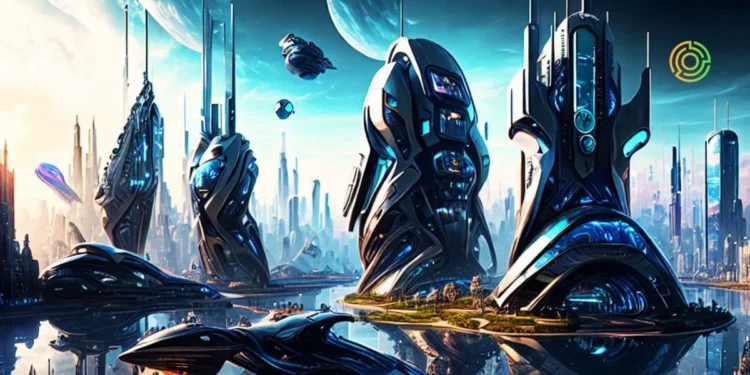In the ever-evolving landscape of technology, the Metaverse stands as the next frontier, promising boundless potential and transformative possibilities. This article delves into the questions surrounding the magnitude, speed, scope, impact, and potential challenges that the Metaverse holds for businesses and individuals alike.
Understanding the Metaverse
At its core, the Metaverse represents the convergence of immersive 3D experiences, persistent shared environments, and the ability to seamlessly traverse identity, assets, and history across virtual worlds.
In his book “The Metaverse: And How It Will Revolutionize Everything,” Matthew Ball defines the Metaverse as a “massively scaled and interoperable network of real-time 3D virtual worlds that can be experienced synchronously and persistently by an effectively unlimited number of users with a sense of individual presence and continuity of data.” This ambitious vision is poised to undergo various manifestations, akin to the early mobile industry before the iPhone set the standard.
Evolution of the Metaverse
Prediction 1: The Scale of the Metaverse
McKinsey and Company forecast that the Metaverse could generate an impact of up to $5 trillion by 2030, rivaling the size of Japan’s current economy. This impact extends predominantly to e-commerce, with additional market influences in virtual learning, advertising, and gaming. Varied estimations on individual Metaverse technologies, such as virtual reality, augmented reality, 3D gaming, and digital twins, showcase a broad spectrum of potential revenue. The Metaverse, encompassing blockchain and decentralized finance technologies, could be valued at around $1.5 trillion by 2030.
Prediction 2: Multiple Metaverses
Contrary to a unified ecosystem, short-term expectations lean towards independent Metaverse platforms with distinct economies and the ability to transfer assets between worlds. Major corporations like Nike, Adidas, Gucci, and Tiffany are already venturing into the Metaverse, likely establishing a presence across various prominent Metaverse platforms.
Prediction 3: Transformation of Business Processes
The Metaverse is poised to impact every facet of business operations, from work processes and product offerings to distribution methods and overall business operations. Companies are anticipated to construct their own Metaverse realms before stepping into the physical world, streamlining workspace designs, technologies, and processes, thereby reducing rework and errors.
Prediction 4: Emerging Security and Privacy Challenges
As the Metaverse unfolds, heightened concerns regarding cybersecurity, privacy rights, regulatory compliance, brand reputation, and anti-fraud efforts will emerge. 3D capture techniques collecting extensive personal and biometric information may pose security risks. Proactive measures, starting at the service level, will be crucial to maintaining security irrespective of the trajectory of corporate assets within the Metaverse.
Prediction 5: Expanding Beyond Virtual Showrooms
The business side of the Metaverse will leverage advancements in 3D modeling software, lidar capabilities, and scalable multi-user environments to address problems innovatively. This extends beyond virtual showrooms and 360-degree displays, exploring applications that combine visualization with real-time data for enhanced collaboration, risk forecasting, fraud detection, and other operational functions.
Prediction 6: Comprehensive Digital Twins
Enterprises will integrate technologies capturing and extracting processes to model both business processes and physical assets. This amalgamation of 3D capture techniques, such as lidar, will enable the recreation of entire organizations within the Metaverse, enhancing efficiency and preparedness for expected and unexpected challenges.
Prediction 7: Transformation and Automation of Customer Service and Sales
The Metaverse will revolutionize customer service by facilitating improved interactions through digital twin support agents. Virtual assistance in problem-solving or product demonstrations will become commonplace, offering a more immersive and effective customer experience.
Prediction 8: Digital-First Evolving to Meta-First
The shift from digital-first to meta-first will witness products being launched in virtual realms before their physical counterparts. This transition enables a better understanding of customer preferences, co-creation of offerings, and knowledge sharing between development and marketing teams.
Prediction 9: Integration of Reality into the Metaverse
The Metaverse presents an opportunity to merge geometry, material intelligence, and the laws of physics. This integration will profoundly impact product development, engineer collaboration, and overall business functionality, driven by more effective modeling techniques utilizing AI and real-time algorithms.
Prediction 10: Consolidation of Metaverse Technologies
Providers will rebrand existing products and services as core components of corporate Metaverse strategies, including commerce, blockchain, distributed infrastructure, digital twins, and customer experience. Ongoing experimentation within an innovative ecosystem will be critical for companies to adapt and engage effectively.
Prediction 11: Gamification Driving Immersive Technologies
Innovations in blockchain and non-fungible tokens have birthed the play-to-earn (P2E) gaming industry. The Metaverse’s gamification strategies may face resistance from traditional gaming journalists concerned about diminishing the essence of the Metaverse experience. Calm technologies will evolve to counteract gamification, preserving seamless navigation through immersive news experiences.
See also: Metaverse Made Simple – The Ultimate Guide to Understanding the Metaverse
Prediction 12: Acceleration of Robotic Innovations
The Metaverse extends beyond human interaction, offering invaluable applications in training smarter robots. High-fidelity models of real-world environments will enable engineers to address challenges virtually, providing synthetic data for testing, validating, and optimizing autonomous systems.
In conclusion, the Metaverse’s impact on businesses is multifaceted, spanning economic scales, technological advancements, and societal shifts. As companies navigate this uncharted territory, a proactive and experimental approach will be vital for harnessing the full potential of the Metaverse in the coming decade.
FAQs
What is the Metaverse?
The Metaverse is a massively scaled and interoperable network of real-time 3D virtual worlds. It allows users to experience immersive environments synchronously and persistently, transcending traditional boundaries and offering a sense of individual presence and data continuity.
How will the Metaverse impact businesses?
The Metaverse is poised to transform various aspects of businesses, influencing work processes, product offerings, distribution methods, and overall operations. Companies are expected to build their own Metaverse realms, enhancing collaboration and streamlining processes.
Can the Metaverse be quantified economically?
Estimates vary, but McKinsey and Company predict the Metaverse could generate a massive impact of up to $5 trillion by 2030. However, other predictions focus on specific Metaverse technologies, suggesting diverse revenue streams from virtual reality, augmented reality, 3D gaming, digital twins, blockchain, and decentralized finance.
Will there be multiple Metaverses?
In the short term, it is likely that there will be independent Metaverse platforms with distinct economies. Major corporations are already venturing into the Metaverse, contributing to the presence of multiple Metaverse ecosystems.
What challenges will the Metaverse face?
Security and privacy concerns will expand as the Metaverse evolves, presenting challenges in cybersecurity, privacy rights, regulatory compliance, brand reputation, and anti-fraud efforts. Proactive measures at the service level are essential to maintain security in the Metaverse.
How will the Metaverse impact customer service?
The Metaverse will revolutionize customer service by enabling virtual agents from digital twins to assist consumers virtually. This will result in a more immersive and effective customer experience, allowing for real-time problem-solving and product demonstrations.
Is the Metaverse only for virtual showrooms?
No, the business side of the Metaverse will extend beyond virtual showrooms. Advancements in 3D modeling, lidar capabilities, and scalable multi-user environments will drive innovation in collaboration, risk forecasting, fraud detection, and other operational functions.
How can companies leverage digital twins in the Metaverse?
Companies can use digital twins to recreate their entire organizations within the Metaverse. This allows for better efficiency, planning, and preparation for expected and unexpected challenges, enhancing the overall operational capabilities of businesses.
Will gamification play a role in the Metaverse?
Yes, gamification will be a significant aspect of the Metaverse, driving immersive technologies. Innovations in blockchain and non-fungible tokens have already led to the play-to-earn (P2E) gaming industry within the Metaverse.
What about the integration of reality into the Metaverse?
The Metaverse presents an opportunity to merge geometry, material intelligence, and the laws of physics. This integration will profoundly impact product development, engineer collaboration, and overall business functionality, driven by more effective modeling techniques utilizing AI and real-time algorithms.
How can businesses prepare for the Metaverse?
Businesses should adopt a proactive and experimental approach to navigate the Metaverse. Continuous experimentation within an innovative ecosystem will be crucial for adapting and engaging effectively with the evolving Metaverse landscape.
Follow us on our social networks and keep up to date with everything that happens in the Metaverse!
Twitter Linkedin Facebook Telegram Instagram Google News Amazon Store
Recent Posts
- Coinstore hits 10 Million Users Milestone, Join Grand Celebration with $100,000 + Prize Pool
- Domus Crypto Launches LIA, an AI-Driven Assistant for Personalized Portfolio Management
- BitGo Launches Institutional Support for sBTC, Expanding Bitcoin DeFi Accessibility
- BTC price prediction today: It will rise to $138,500 by the end of 2025. SAVVY MINING teaches you how to earn a stable income online every day
- The Future of Work in the Metaverse: Virtual Jobs or Reality?











































